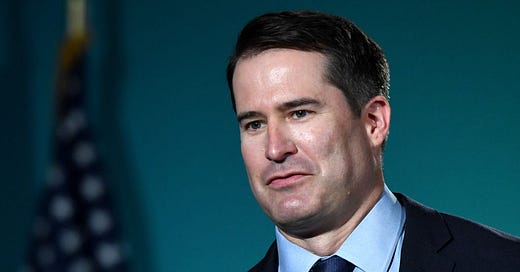
In a parallel universe, progressives would be rallying around Democratic congressman Seth Moulton. They would respect his courage for saying what so many of them have been thinking since Donald Trump thumped Kamala Harris in the presidential election. They would be urging him—publicly—to run for president. A billionaire, probably in Silicon Valley or New York, would have launched a super PAC called “Moulton 2028,” calling the congressman “the voice America needs.” They would love him.
But in this universe, the one we actually inhabit, they hate him.
“We’ve worked so hard at becoming tolerant that we’ve become intolerant,” Moulton, who represents the suburbs north of Boston, told me Wednesday.
The hate started exactly two weeks ago, when Moulton told The New York Times, in an article explaining why Kamala Harris lost, that the Democratic Party had become overly focused on trans issues.
“Democrats spend way too much time trying not to offend anyone rather than being brutally honest about the challenges many Americans face,” Moulton told the Times. “I have two little girls, I don’t want them getting run over on a playing field by a male or formerly male athlete, but as a Democrat I’m supposed to be afraid to say that.”
Moulton’s daughters are 6 and 3, and he told me he was talking about team sports they might play when they’re older. When I asked what prompted him to make comments that he must have known would antagonize his fellow Democrats—who have long adhered to the orthodoxy that trans women are women who should be able to compete in women’s sports—he replied: “I was speaking authentically as a dad about a concern that I know other dads share, and we just ought to be able to debate it.”
Since then, progressives have called him a “Nazi cooperator,” “transphobic,” and “offensive.” Democrats have said he should resign. His campaign manager has stepped down. Massachusetts Democratic governor Maura Healey, who is gay, attacked Moulton for “playing politics.” Even Jake Auchincloss, who, like Moulton, is a former Marine and now a Democratic congressman from Massachusetts, has distanced himself from Moulton’s trans remarks. (Moulton declined to comment on Auchincloss.)
Meanwhile, the chair of Tufts University’s political science department threatened to bar students from interning in Moulton’s office, which prompted the college’s high command to assure the congressman they still like him (Tufts is a major recipient of National Institutes of Health grants; probably not wise to lash out at a member of the Massachusetts congressional delegation.) Which prompted the editorial board at The Tufts Daily, predictably, to condemn Moulton.
“[W]e believe that cutting ties with Moulton’s office is not a suppression of speech,” the board wrote. “In fact, it is quite the opposite. It is our way of expressing our disgust with Moulton’s brazen scapegoating of an already oppressed community.”


